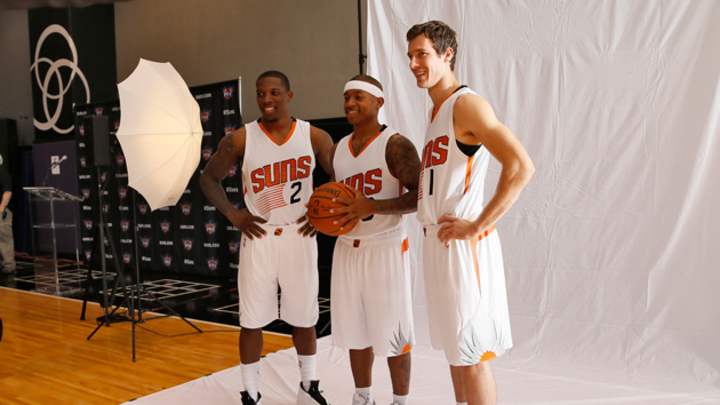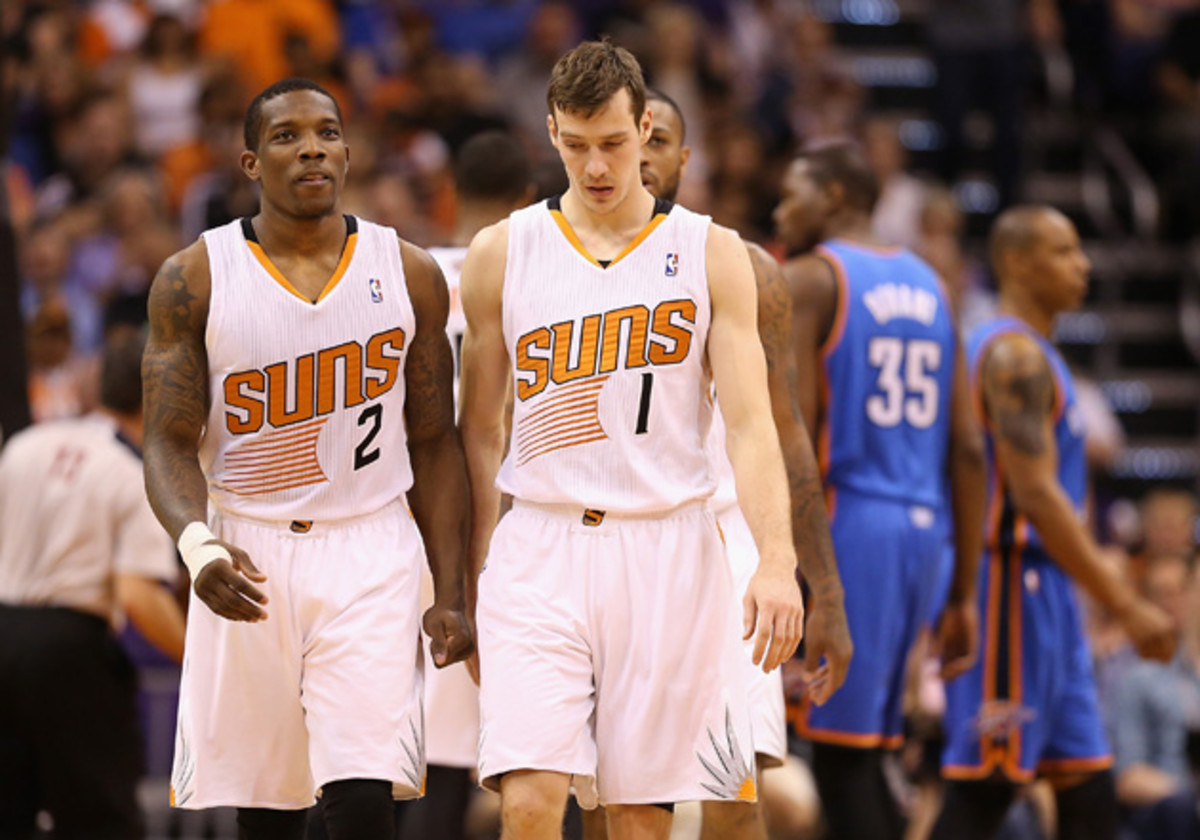Suns' road to the playoffs full of uncertainty and potential issues

The Phoenix Suns' 2013-14 season was one of excruciating proximity. Lowly preseason expectations were quickly laid to waste, and by the final stretch of the season the Suns were within reach of their first playoff appearance since 2010. They couldn't close the gap. The final tally put Phoenix at 48 wins, just one behind eighth-seeded Dallas, two behind seventh-seeded Memphis and three behind sixth-seeded Golden State. Such standing could not undo what had been a marvelous run all the same, but the Suns without a doubt would have preferred the fulfillment of playoff qualification to that sobering dose of bittersweet.
As we look forward, though, maybe it's best that Phoenix is already used to the flavor. There is no question that the Suns, as constructed, are a good team. This is a team with an offense so unrelenting that it challenges even the best defenses in the league. Under Jeff Hornacek they've made a weapon not only of pace but of tempo—smoothing over transitions from one action to another to keep a consistent flow. Goran Dragic found himself in that system last season and Eric Bledsoe exploded in his first season as a starter. Joining them will be former Kings point guard Isaiah Thomas, a third ball handler to apply even more pressure to opposing defenses.
• NBA PREVIEWS: Northwest | Pacific | Southwest | Southeast
Breaking into the Western Conference playoffs, though, requires a team to be good enough to displace one of an established eight—most of which have improved over the course of the offseason. Dallas boasts an upgraded roster that should result in a higher win total. Memphis, with better health, should post more than the 50 wins they did last year. Golden State has room to grow offensively under Steve Kerr and the potential to finish as one of the top four in the West. The playoff bubble, then, has given way to a more rigid boundary.

That leaves Phoenix in a tricky spot. More of the same won't likely cut it. The Suns, though, have relatively modest means for internal improvement despite a young roster. Bledsoe, Miles Plumlee and/or Markieff Morris could show notable progress in the coming year. Assuming the best in terms of their development, how much good might that improvement do in the context of a team set for some regression?
Pacific preview: Can the Warriors overtake the Clippers for No. 1?
Dragic's success, in a sense, doubles as a slight reason for concern. As marvelous as Dragic was, a seventh-year player hitting completely unexpected performance markers warrants caution. Phoenix's style of play accounts for some of his breakthrough due to Dragic's natural fit in the spread pick-and-roll. Still he faces some burden of proof with regard to sustaining that play, if only to stand up to the natural fluctuation of basketball performance. Dragic has clearly matured in the way that he navigates the defensive interior and chooses his passing angles—as was evident in his career-high scoring and career-low turnover rate. That in itself unfortunately doesn't guarantee that he plays to the same lofty standard every year going forward.
There's room for Dragic to be talented, effective, and empowered by the system without performing at an All-NBA level. We have all the reason to hope that's not the case, if only because the world-beating Dragic we saw last season is as fun and unpredictable a player as you'll find in the NBA. Should the quality of his play slip, however, what might that mean for a Suns team that depended on the never-before-seen version of Dragic that registered as one of the top guards in the league?
It's difficult to say, particularly when so many other Suns had personal-best seasons of their own. Credit goes to each of them—Bledsoe, Plumlee, Gerald Green, P.J. Tucker, both Morris brothers—and to Hornacek. But with a rising tide comes a corresponding swell in perceptive variability. Each player's rise drew on player development, systemic strength and streaking success to different degrees. Only in time will we know just where each individual piece stands. This is fair cause for reservation.
Evaluating over/under win totals for the 2014-15 NBA season
At the very least the Suns have negatively altered their power forward rotation. Channing Frye started in that spot last season but was quickly lured away by Orlando's four-year, $32 million offer in free agency. That Phoenix balked at Frye's price was understandable, and the Suns signed an affordable, functional shooting big in Anthony Tolliver to help offset his departure. The compromise therein could prove painful. Tolliver is at best a superficial substitute, similar to Frye in only the most basic sense. Phoenix needs a big capable of stretching the floor and Tolliver, who shot 41.3 percent from deep for Charlotte last season, satisfies that requirement. So many facets of Frye's appeal, though, are lost in the transition: His gravity as a shooter, his useful interior defense and the size to fill center minutes, among other qualities.
Phoenix came to rely on Frye last season for those reasons, and over the course of the year found that the offense sputtered whenever he checked out of the game. Possessions sailed smoothly when Frye pulled at the attention of the defense—as is natural when opponents must account for Dragic's creativity and Bledsoe's raw speed in conjunction with a sharp-shooting big. That's more than most defenses can handle on a play-by-play basis, which yielded the Suns 110.4 points per 100 possessions in Frye-bolstered minutes according to NBA.com. In those stretches without Frye—despite the presence of a capable backup in Markieff Morris—Phoenix scored roughly eight fewer points, reducing their furious attack to the efficiency of a bottom-10 offense.
There are too many other factors in play to assume that kind of collapse for the Suns. Tolliver will help, as will Thomas' ball handling and scoring prowess. Losing Frye, however, adds further complication to Phoenix's need to progress in the short term—particularly to a degree that would make for a surer playoff berth. The Suns have a shot at the postseason and should be in the playoff picture all season long, just as they were last year. Whatever chance they have of pushing through, however, is smothered by layer upon layer of uncertainty.
